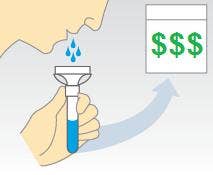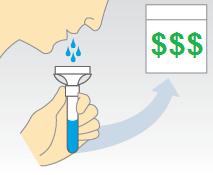23andMe Raises $22 Million in Funding – SNP Genetics Isn’t Dead

Share
23andMe, one of the pioneering companies of personal genetics, is ramping up for another round of growth. According to a recent press release, the Mountain View based DNA analysis business raised more than $22 million in Series C funding. While it's no surprise that early investors Google Ventures and New Enterprise Associates continued to back 23andMe (Google founder Sergey Brin is married to 23andMe founder Anne Wojicicki), the arrival of newcomer Johnson & Johnson Development Corporation shows that the startup is still attractive to outsiders. Wojicicki commented that the $22 million would go a long way towards expanding their research efforts. While 23andMe has had its issues in the past, this new round of funding could be a sign that the company is ready to bounce back stronger than ever.
Companies like 23andMe test the DNA of customers and analyze it for important single nucleotide polymorphisms (SNPs) - a process that has drawn fire in the past year for its over simplifications. 10 years after the first human genome was sequenced, genetic analysis has yet to provide clinically proven benefits to the majority of customers who use the services of companies such as 23andMe. The FDA, US Congress, and other government regulatory bodies are actively investigating how best to control mail order DNA testing. Experts, like Craig Venter, have dismissed the current state of personal genetics almost entirely. How much can we really predict about your health from just a few random variations in your DNA? Analyzing SNPs may be too simple of an approach to understanding the importance of your genes.
Be Part of the Future
Sign up to receive top stories about groundbreaking technologies and visionary thinkers from SingularityHub.


Yet clearly 23andMe's investors are making a $22 million gamble that SNPs will prove to be a valuable commodity in the years ahead. It could pay off. At the recent annual meeting for the American Society of Human Genetics, 23andMe presented some of its ongoing research in linking SNPs to important medical conditions. Last year, they set out to gather data on 10,000 Parkinson's patients, and have managed to collect samples from 3500 so far (with an additional 20,000 controls). 23andMe has also replicated 100 known associations for genetic conditions and found genetic links for the Mumps. All of this is part of their more general project of democratizing genetic research through customer data collection and feedback.
I don't know how personal genetics will evolve in the next few years. If I had to take a guess it would be that whole genome sequencing, which is steadily dropping its price towards the $1000 level, will become the new gold standard. Where this will leave SNP analysis and personal DNA testing companies no one can say. It's an uncertain time, but I think that 23andMe is making the right call. The only way they're going to survive is by increasing our understanding of genetics. Research is the key to validating the personal genetics industry. We'll see if $22 million is enough to make that happen.
[image credit:23andMe (modified)]
[source: 23andMe blog and press release]
Related Articles

Single Injection Transforms the Immune System Into a Cancer-Killing Machine

This Light-Powered AI Chip Is 100x Faster Than a Top Nvidia GPU

This Week’s Awesome Tech Stories From Around the Web (Through December 20)
What we’re reading
